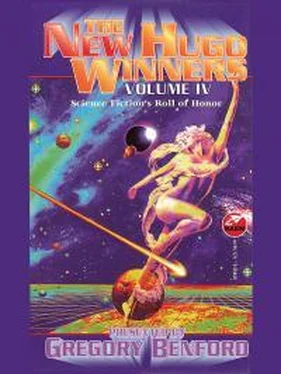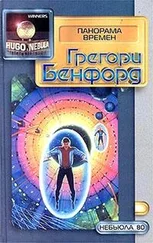Грегори Бенфорд - The New Hugo Winners - Volume IV
Здесь есть возможность читать онлайн «Грегори Бенфорд - The New Hugo Winners - Volume IV» весь текст электронной книги совершенно бесплатно (целиком полную версию без сокращений). В некоторых случаях можно слушать аудио, скачать через торрент в формате fb2 и присутствует краткое содержание. Год выпуска: 1997, ISBN: 1997, Издательство: Baen, Жанр: Фантастика и фэнтези, на английском языке. Описание произведения, (предисловие) а так же отзывы посетителей доступны на портале библиотеки ЛибКат.
- Название:The New Hugo Winners - Volume IV
- Автор:
- Издательство:Baen
- Жанр:
- Год:1997
- ISBN:0-671-87852-2
- Рейтинг книги:5 / 5. Голосов: 1
-
Избранное:Добавить в избранное
- Отзывы:
-
Ваша оценка:
- 100
- 1
- 2
- 3
- 4
- 5
The New Hugo Winners - Volume IV: краткое содержание, описание и аннотация
Предлагаем к чтению аннотацию, описание, краткое содержание или предисловие (зависит от того, что написал сам автор книги «The New Hugo Winners - Volume IV»). Если вы не нашли необходимую информацию о книге — напишите в комментариях, мы постараемся отыскать её.
The New Hugo Winners - Volume IV — читать онлайн бесплатно полную книгу (весь текст) целиком
Ниже представлен текст книги, разбитый по страницам. Система сохранения места последней прочитанной страницы, позволяет с удобством читать онлайн бесплатно книгу «The New Hugo Winners - Volume IV», без необходимости каждый раз заново искать на чём Вы остановились. Поставьте закладку, и сможете в любой момент перейти на страницу, на которой закончили чтение.
Интервал:
Закладка:
"Now Goneril's change in appearance as Lear's curse proceeded was good. The viewer will gauge the devastating effect it has on her even though her iron will won't let it show in words. The viewer will therefore feel the devastating effect upon himself, too, even if some of the words Lear uses are strange to him.
"In that connection, we must remember to make the Fool look older with every one of his appearances. He's a weak, sickly fellow to begin with, broken-hearted over the loss of Cordelia, frightened to death of Goneril and Regan, destroyed by the storm from which Lear, his only protector, can't protect him—and I mean by that the storm of Lear's daughter's as well as of the raging weather. When he slips out of the play in Act III, Scene VI, it must be made plain that he is about to die. Shakespeare doesn't say so, so the Fool's face must say so.
"However, we've got to do something about Lear. The voice-recorder was on the right track by having a hissing sound in the voice-track. Lear is spewing venom; he is a man who, having lost power, has no recourse but vile and extreme words. He is a cobra who cannot strike. But I don't want the hiss noticeable until the right time. What I am more interested in is the background."
The woman in charge of background was Meg Cathcart. She had been creating backgrounds for as long as the compu-drama technique had existed.
"What do you want in background?" Cathcart asked, coolly.
"The snake motif," said Willard. "Give me some of that and there can be less hiss in Lear's voice. Of course, I don't want you to show a snake. The too obvious doesn't work. I want a snake there that people can't see but that they can feel without quite noting why they feel. I want them to know a snake is there without really knowing it is there, so that it will chill them to the bone, as Lear's speech should. So when we do it over, Meg, give us a snake that is not a snake."
"And how do I do that, Jonas?" said Cathcart, making free with his first name. She knew her worth and how essential she was.
He said, "I don't know. If I did I'd be a backgrounder instead of a lousy director. I only know what I want. You've got to supply it. You've got to supply sinuosity, the impression of scales. Until we get to one point. Notice when Lear says, 'How sharper than a serpent's tooth it is to have a thankless child.' That is power. The whole speech leads up to that and it is one of the most famous quotes in Shakespeare. And it is sibilant. There is the 'sh,' the three s's in 'serpent's' and in 'thankless,' and the two unvoiced 'th's in 'tooth' and 'thankless.' That can be hissed. If you keep down the hiss as much as possible in the rest of the speech, you can hiss here, and you should zero in to his face and make it venomous. And for background, the serpent—which, after all, is now referred to in the words—can make its appearance in background. A flash of an open mouth and fangs, fangs— We must have the momentary appearance of fangs as Lear says, 'a serpent's tooth.' "
Willard felt very tired suddenly. "All right. We'll try again tomorrow. I want each one of you to go over the entire scene and try to work out the strategy you intend to use. Only please remember that you are not the only ones involved. What you do must match the others, so I'll encourage you to talk to each other about this—and, most of all, to listen to me because I have no instrument to handle and I alone can see the play as a whole. And if I seem as tyrannical as Lear at his worst in spots, well, that's my job."
Willard was approaching the great storm scene, the most difficult portion of this most difficult play, and he felt wrung out. Lear has been cast out by his daughters into a raging storm of wind and rain, with only his Fool for company, and he has gone almost mad at this mistreatment. To him, even the storm is not as bad as his daughters.
Willard pointed his baton and Lear appeared. A point in another direction and the Fool was there clinging, disregarded, to Lear's left leg. Another point and the background, came in, with its impression of a storm, of a howling wind, of driving rain, of the crackle of thunder and the flash of lightning.
The storm took over, a phenomenon of nature, but even as it did so, the image of Lear extended and became what seemed mountain-tall. The storm of his emotions matched the storm of the elements, and his voice gave back to the wind every last howl. His body lost substance and wavered with the wind as though he himself were a storm cloud, contending on an equal basis with the atmospheric fury. Lear, having failed with his daughters, defied the storm to do its worst. He called out in a voice that was far more than human:
"Blow, winds, and crack your cheeks! rage! blow!
You cataracts and hurricanoes, spout
Till you have drench'd our steeples, drown'd the cocks!
You sulph'rous and thought-executing fires.
Vaunt-couriers to oak-cleaving thunderbolts,
Singe my white head! And thou, all-shaking thunder,
Strike flat the thick rotundity o' th' world.
Crack Nature's moulds, all germains spill at once.
That make ingrateful man."
The Fool interrupts, his voice shrilling, and making Lear's defiance the more heroic by contrast. He begs Lear to make his way back to the castle and make peace with his daughters, but Lear doesn't even hear him. He roars on:
"Rumble thy bellyful! Spit, fire! spout, rain!
Nor rain, wind, thunder, fire are my daughters.
I tax not you, you elements, with unkindness.
I never gave you kingdom, call'd you children,
You owe me no subscription. Then let fall
Your horrible pleasure. Here I stand your slave,
A poor, infirm, weak, and despis'd old man . . ."
The Duke of Kent, Lear's loyal servant (though the King in a fit of rage has banished him) finds Lear and tries to lead him to some shelter. After an interlude in the castle of the Duke of Gloucester, the scene returns to Lear in the storm, and he is brought, or rather dragged, to a hovel.
And then, finally, Lear learns to think of others. He insists that the Fool enter first and then he lingers outside to think (undoubtedly for the first time in his life) of the plight of those who are not kings and courtiers.
His image shrank and the wildness of his face smoothed out. His head was lifted to the rain, and his words seemed detached and to be coming not quite from him, as though he were listening to someone else read the speech. It was, after all, not the old Lear speaking, but a new and better Lear, refined and sharpened by suffering. With an anxious Kent watching, and striving to lead him into the hovel, and with Meg Cathcart managing to work up an impression of beggars merely by producing the fluttering of rags, Lear says:
"Poor naked wretches, wheresoe'er you are,
That bide the pelting of this pithess storm.
How shall your houseless heads and unfed sides,
Your loop'd and window'd raggedness, defend you
From seasons such as these? O, I have ta'en
Too little care of this! Take physic, pomp;
Expose thyself to feel what wretches feel,
That thou mayst shake the superflux to them
And show the heavens more just."
"Not bad," said Wilbur, eventually. "We're getting the idea. Only, Meg, rags aren't enough. Can you manage an impression of hollow eyes? Not blind ones. The eyes are there, but sunken in."
"I think I can do that," said Cathcart.
It was difficult for Willard to believe. The money spent was greater than expected. The time it had taken was considerably greater than had been expected. And the general weariness was far greater than had been expected. Still, the project was coming to an end.
Читать дальшеИнтервал:
Закладка:
Похожие книги на «The New Hugo Winners - Volume IV»
Представляем Вашему вниманию похожие книги на «The New Hugo Winners - Volume IV» списком для выбора. Мы отобрали схожую по названию и смыслу литературу в надежде предоставить читателям больше вариантов отыскать новые, интересные, ещё непрочитанные произведения.
Обсуждение, отзывы о книге «The New Hugo Winners - Volume IV» и просто собственные мнения читателей. Оставьте ваши комментарии, напишите, что Вы думаете о произведении, его смысле или главных героях. Укажите что конкретно понравилось, а что нет, и почему Вы так считаете.








